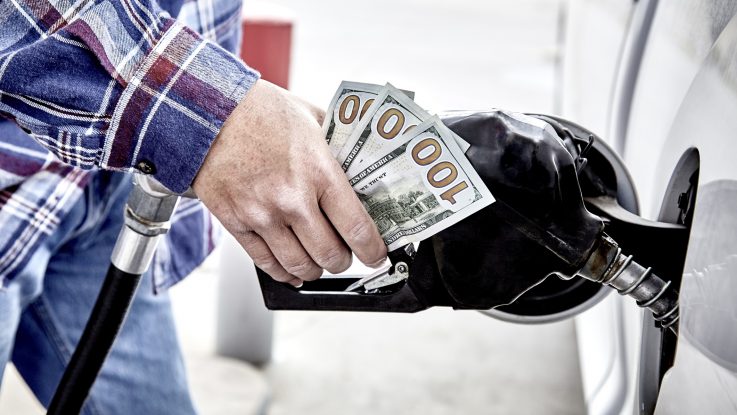
 With rising fuel prices, are you wondering if you should still take that big RV trip? Here are four steps for all RV owners – gas or diesel, motorized or towable – to combat higher fuel prices.
With rising fuel prices, are you wondering if you should still take that big RV trip? Here are four steps for all RV owners – gas or diesel, motorized or towable – to combat higher fuel prices.
Fuel Saving Step #1 – Slow Down
It’s a matter of science: increased speed uses more energy and, therefore, more fuel to overcome increasing air resistance. The relationship is approximately a 3:1 ratio. What this translates to is that for every 5 miles you drive over 60 MPH, fuel economy drops roughly 8% for the average passenger vehicle. This drop is even greater for a motorhome or vehicle pulling a large travel trailer or fifth wheel.
It is believed by many that 55 MPH is the appropriate speed to maximize fuel efficiency. This, of course, depends on your specific vehicle, but slowing down is one sure way to improve fuel economy. RVers are encouraged to slow down anyway, if just to enjoy the scenery!
Fuel Saving Step #2 – Drive Shorter Distances
Another way to get the most out of each fuel fill-up is to drive shorter distances and spend more time at a single location. Check out our post about planning RV trips.
Why not experience the lifestyle closer to home rather than heading out of state? Search for a nearby campground and make it your “go to.” In fact, the Recreation Vehicle Industry Association (RVIA), reports that 21% of RVers will reserve a seasonal site at a campground this summer and visit it on weekends.
Fuel Saving Step #3 – Inflate Tires Accurately
A lesser-known means of saving fuel, as well as maintenance costs, is to be sure all RV tires are inflated to the correct air pressure. This is only achievable by knowing exactly how much weight each tire position is supporting. Tire manufacturers publish recommended maximum inflation charts for every tire size.
It is important to note that the pressure indicated on the tire’s sidewall is the maximum inflation pressure for that tire and NOT the recommended pressure. Furthermore, the RV maker or your RV dealer will not publish a suggested pressure either. Simply put, manufacturers cannot predict how much gear you will load into your RV; each RV’s weight is unique.
It is highly recommended to have your RV properly weighed using individual scales by an accredited RV entity such as the RV Safety and Education Foundation (RVSEF). RVSEF provides this weighing service at most FMCA RV Expos.
Watch this video to learn more about proper RV tire pressure:
Fuel Saving Step #4 – Minimize Idling
Idling results in wasted fuel. When idling, the fuel consumed results in 0 MPH. Plus, idling is not beneficial to the environment. Turn off the engine when stopped or parked for any lengthy period of time.
RVing = Saving $$$
Although rising fuel prices are a hot topic, RVing continues to be one of the most cost-effective and enjoyable forms of travel for many. According to survey results collected by the RVIA, RV travel saves a family of four 27% to 62% compared to the cost of other types of travel.
The bottom line: Don’t let high fuel prices minimize your excitement about summer RV trips. RVing is still cost effective, compared to other forms of travel. Use these four tips, and enjoy the ride!
Have you tried these tips? Comment below.
This information is for educational purposes. FMCA shall not be responsible nor retain liability for RVer’s use of the provided information. Prior to making any RV service decision, you are advised to consult with an RV professional.


Slowing down is not always a fuel saving technique… In our 40 Beaver with a C-12 and Allison 4000 tranny, If I slow down below 60 mph it drops down to 5th gear and my mileage is less… My best millage is round 65 mph..
A point not made in your article is making sure you have a clean air filter… By enlarging the air intake and using a more efficient muffler, I was able to bring my mpg up from 5.2 to 7.3 mpg…
Good basic article. No comments on using the generator to run the AC while driving. What’s the impact of the generator?